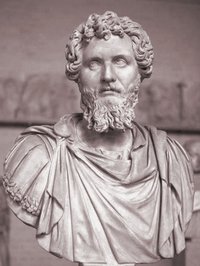Septimius Severus
|
|
Lucius Septimius Severus, (April 11, 146 - February 4, 211) was Roman emperor from April 9, 193 to 211. Some scholars claim that he was a Berber, and others claim that he was Punic.
He was born at Leptis Magna (62 miles south east of Carthage), on the north coast of Africa, died at Eboracum (York), England. Severus' family was of equestrian rank, and in 172 he seems to have been made a senator by Marcus Aurelius. In 190 he became consul, and in the following year received from Commodus the command of the legions in Pannonia. On the murder of Pertinax by the troops in 193, they proclaimed Septimius emperor, whereupon he hurried to Italy and took possession of Rome without opposition. The legionaries of Syria, however, proclaimed Pescennius Niger emperor and those of Britain, Clodius Albinus; it was not until 197 that all competing claimants were eliminated. On 17 February 197, in the Battle of Lugdunum, with an army of 100,000 men, mostly composed of Illyrian, Moesian and Dacian legions, Severus defeated and killed his rival Clodius Albinus, securing full control over the Empire.
In the later years of his reign Septimius undertook a number of military actions in defence of Roman Britain against barbarian incursions and undertook reconstruction of Hadrian's Wall before dying in York on 4 February 211.
Aureus_Septimius_Severus-193-leg_XIIII_GMV.jpg
Septimius Severus was at heart a soldier, and sought glory through military exploits. He waged a brief and successful war against the Parthian Empire, which restored the northern half of Mesopotamia to Rome. During that war, his soldiers sacked the Parthian capital of Ctesiphon and sold the survivors into slavery.
His relations with the Roman Senate were never good. He was unpopular with them from the outset, having seized power with the help of the military, and he returned the sentiment. Severus ordered the execution of dozens of senators on charges of corruption and conspiracy against him, replacing them with his own favorites. He also disbanded the Praetorian Guard and replaced it with one of his own, made up of 50,000 loyal soldiers camped in and around Rome.
Although his actions turned Rome into a military dictatorship, he was popular with the citizens of Rome, having stamped out the moral degeneration and rampant corruption of the reign of Commodus. When he returned from his victory over the Parthians, he erected a triumphal arch that still stands and bears his name to this day.
Upon his death in 211, he was deified by the Senate and succeeded by his two quarrelsome sons, Caracalla and Geta, who were advised by his wife Julia Domna. The stability Severus had provided the empire was soon gone.
Leptis_Magna_arch_Septimius_Severus.jpg
The reign of Septimius provides an interesting example of the persecution meted out to Christians under the Roman empire. Septimius made no new laws against Christians, but allowed the enforcement of laws already long-established. There is no evidence of systematic persecution, and there are many evidences that not only was the emperor not personally hostile to the Christians, but he even protected them against the populace. There were doubtless Christians in his own household, and in his reign the church at Rome had almost absolute peace. On the other hand, individual officials availed themselves of the laws to proceed with rigor against the Christians. Naturally the emperor, with his strict conception of law, did not hinder such partial persecution, which took place in Egypt and the Thebaid, as well as in proconsular Africa and the East. Christian martyrs were numerous in Alexandria (cf. Clement of Alexandria, Stromata, ii. 20; Eusebius, Church History, V., xxvi., VI., i.). No less severe were the persecutions in Africa, which seem to have begun in 197 or 198 (cf. Tertullian's Ad martyres), and included the Christians known in the Roman martyrology as the martyrs of Madaura. Probably in 202 or 203 Felicity and Perpetua suffered for their faith. Persecution again raged for a short time under the proconsul Scapula in 211, especially in Numidia and Mauritania. Later accounts of a Gallic persecution, especially at Lyons, are legendary. In general it may thus be said that the position of the Christians under Septimius Severus was the same as under the Antonines; but the law of this emperor at least shows clearly that the rescript of Trajan had failed to execute its purpose.
see: Severan dynasty family tree, Roman Empire, Byzantine Empire and Byzantine Emperors.
External link
- Life of Septimius Severus (http://penelope.uchicago.edu/Thayer/E/Roman/Texts/Historia_Augusta/Septimius_Severus*.html) (Historia Augusta at LacusCurtius: Latin text and English translation)
Books
- Septimius Severus: The African Emperor by Anthony R. Birley ISBN 0415165911
| Preceded by: Didius Julianus | List of Roman Emperors 193–211 with Caracalla (197–211) and Geta (208–211) | Succeeded by: Caracalla and Geta Template:End boxde:Septimius Severus et:Septimius Severus eo:Septimo Severo fr:Septime Sévère ko:셉티미우스 세베루스 it:Settimio Severo he:ספטימיוס סוורוס nl:Lucius Septimius Severus pl:Septymiusz Sewer pt:Septímio Severo fi:Septimius Severus sv:Septimius Severus |

